The last forest, its lost children

For a while I wondered where I was and why I was not sleeping in the middle of the night. I got the answers instantly.
It was not raining but pouring on me, the water coming through the rickety thatched roof of the bamboo house. My sleeping bag was getting wet, my camera and backpack too.
I bolted up in a flash. I must have beaten any world record in dismantling the mosquito net and packing up a sleeping bag.
Now I knew why my Chakma host was insisting that I slept in the next room. But after a nine-hour journey without food on a small wooden boat — so small that you cannot even rest your back against anything — I felt like closing my eyes wherever I could spread my sleeping bag.
And at this hour, here in this remote place in Khagrachhari I heard the distant thunders rolling, echoed by the hills around. I could see the deep forest in front of my cabin in the sudden flashes across the sky.
But then I was happy and wished for more rain. Because tomorrow I was to travel even deeper into the forest. But Gangaram, the narrow river that I was following, had dried up because there was no rain in the past few days.
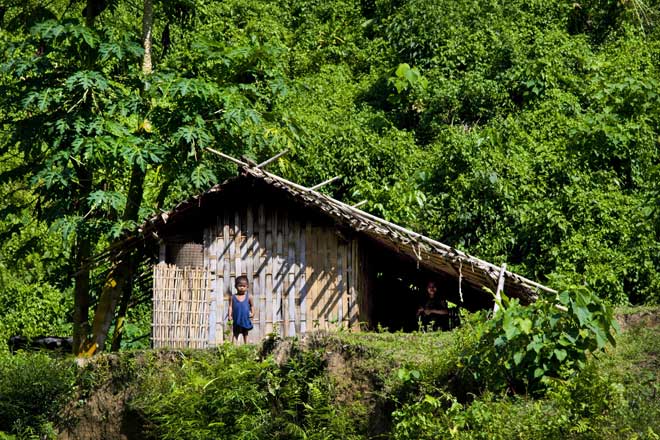
Our boat was getting stuck. I could hear the bottom of the boat grating against the sandy bed. So I had to make the stopover here at Dochhara, a small hill settlement of a few Chakma families. The river Gangaram has bifurcated here to give a name to this place — Do meaning two and Chhara meaning stream.
A bamboo mat was laid out in the open square when we reached Dochhara and I spread myself on it, every inch of my body wanting some rest. A few plastic chairs were produced from somewhere and my guides sat on them.
We discussed our next day’s plan as food was being cooked in a hut. A chicken was killed and soaked in boiled water to skin it. Cabbage chunks were boiled. Flame hot chilli paste mixed with strong smelling Nappi. Small and rounded aubergines grown only in the hills were boiled to go with Dochowani, the local drink.
After nine hours of journey, we were still far away from our destination – Lakhkhichhari Reserve Forest. We had heard this is one hell of a place with giant trees and rare animals and birds. But the problem was even our Chakma guides had not been there before.
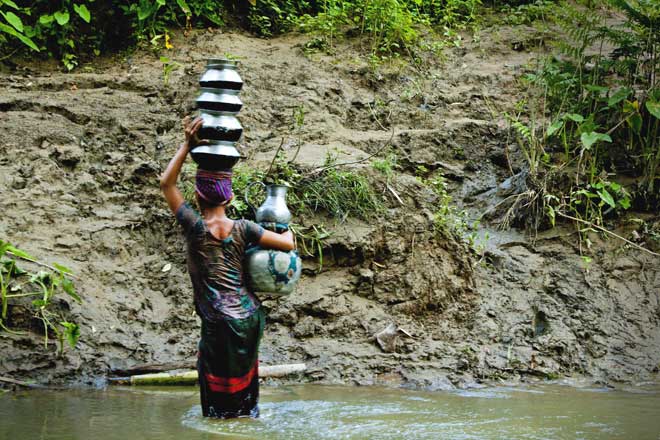
It took us a few months to arrange the trip. We had to establish contacts with at least three armed groups who reign over the forest. Only after getting green signal from them that we knew we were going there.
It was a motley crowd — our guides. A gunman carrying a Remington .22 rifle to guard against wild animal attacks, a journalist from Bagaihat who actually coordinated everything, a young boy of about 20 whose purpose of accompanying us was unclear but he was believed to be a spy from one of the armed groups and a local union parishad member.
And at the end of the first day’s journey, lay under a quarter-moon hanging there in the west, casting a pale light around. Our conservation had now turned to how snakes infest the hills and how frequently people get bitten.
We could see the river flowing by, its water receded even further. We were getting worried. If there was no rain tonight we would either have to walk to the destination or abandon the trip.
Just then there was a yelp from the gunman: “Snake.”
In the beam of the flashlight, we saw this three feet long reptile, red as amber, slithering across the gunman’s foot.
Before any of us could say ‘zip’ the gunman pulled out his knife, slashed the snake into two and flung it into the river. We sat dumbfounded.
We had a silent dinner and dispersed to sleep. But before sleep I had to relieve myself in the bush. It gave me Goosebumps thinking of all those snakes lurking out there.
And right now sitting here all wet in the dark hut I was happy that Gangaram would be full and furious tomorrow and my boat would move.
Woke up at 5.30 and found the hills shinning in golden rays.
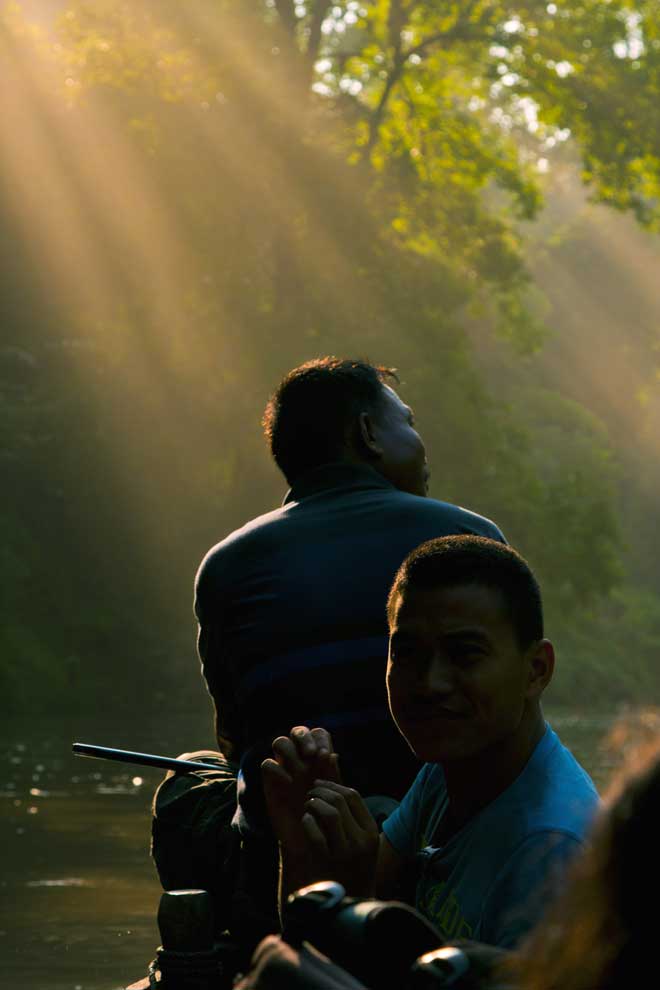
Children were already running around the yard, playing with trivial things. Two kids were having a sword fight with long bean like fruits of Gila tree. One was just playing with his dog, making it run after him and then kicking it in its ribs. The dog yelped but followed the kid again.
We went straight to the boat and started the journey. The river was flowing full with last night’s rain.
The going was excruciatingly slow against a strong current of brown roiling water. Half an hour later, a miraculous change started taking place around us.
We were now engulfed by a dense forest. The Segun trees had ceased to exist here. Instead, Garzans, Chapalis and numerous species unknown to us were standing tall and thick. Along the thin line of the river, the trees made a thick wall and the sky gleaned blue. The river bent and twisted every hundred meters or so.
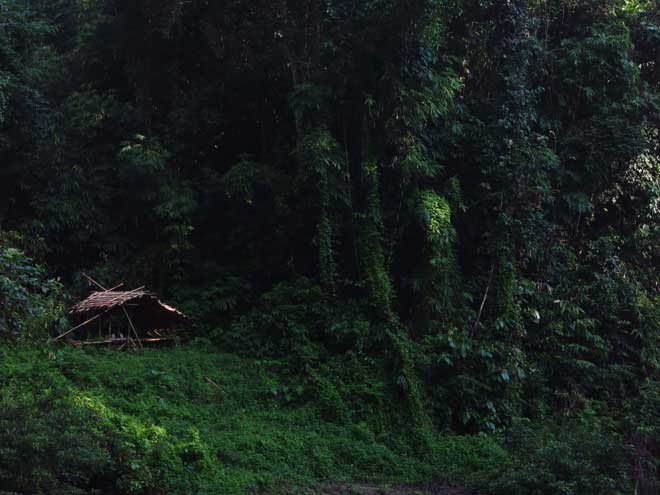
A strange tree full of Rambutang like fruits appeared. A hornbill peered at us through its foliage, a fruit neatly nestled between its beaks. Orange-bellied green pigeons in their troves danced among the branches and fluttered away at our approach. Orange-bellied squirrels ran up and down the tree. I saw the largest flock of hill myna in my life — not less than 300 together.
As the forest deepened we found more of the hornbills. All the way, we met shikras, goshawks, honey buzzards and kestrels. Along the river we met hoof marks of deer and wild boars.
Eight hours later, the river became even narrower and the forest denser. It was 2 o’clock. We stopped the boat and climbed up the bank to find a hut.
We were hungry and the Chakma family was too hospitable to let us use their kitchen. We were carrying our own supplies – lots of cabbages, beans, eggs, rice and lentils.
Preparing meal took an hour. While the food was cooking, we played with a baby monkey that the family had captured and was keeping as a pet. We gave it lozenge which it gleefully sucked on, casting around gratifying glances. I found no difference between this cute animal and the baby in our house. It would climb to our head and swing from our arms.
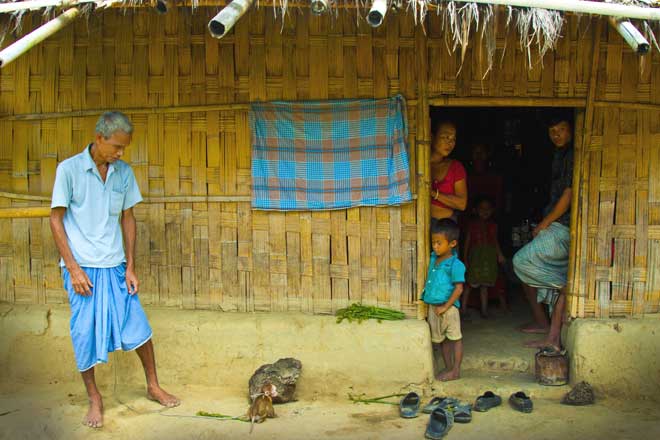
“Do you want to take it?” Susanta, the owner of the monkey, asked me. “It’s very gentle. A good pet.”
I shook my head and sighed. This man had no idea about city life. Apartments do not offer the luxury of keeping a pet.
Lakhkhichhara forest was just across the river standing in its hermit-like silence. I looked at it for a long time, taking in its majestic beauty. A forest has two kinds of beauty — the outer layer and the inner soul.
The outer layer gives it the form. The attraction. But once you enter, you will not find that any more. The inner soul will take over. The inner soul is much more intimate, much more critical and microscopic. The ants, the cicadas, the rotting stumps, the bulbs and the petals, the strange leaves and formations and the smell. It’s not a singular experience ever.
The deep green of the outer layer had a mesmerizing effect on me. I felt like a primitive man from the ancient time who needs to explore the inner wealth of the forest. I could feel a wave like static electricity passing through me. I felt restless to face its diversity.
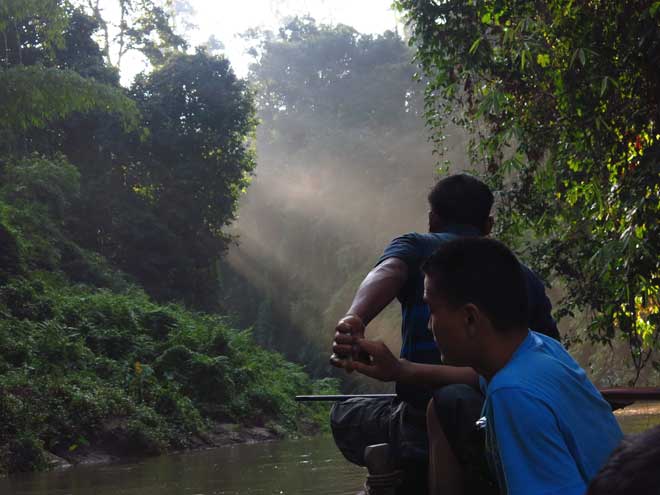
After lunch we walked across the river and stepped into the forest. And for us life changed forever.
None of us have ever experienced anything like this. The trees had sprung at least 500 feet high, some of them reaching about a thousand feet. They were thick. Five of us stretched our hands together and yet could not encircle one tree.
Lantana creepers as thick as the trunk of an elephant had come down the trees, hanging and touching other trees like huge pythons. We found strange toadstools and mushrooms growing in the soggy nooks and corners. A big toadstool shone black as if dipped in tar. Saucer shaped orange mushrooms had bloomed on rotting trees.
Hornbills fluttered off a high branch. We were startled by the clear call of bamboo partridges: “Da-khooo. Da-khoo” almost sounding like “Look at me” in Bangla. We could hear trogon’s call..
Sambars, rabbits, boars and otters had run around the forest. Their marks were everywhere.
We did not find a single tree that had been chopped down. It was truly a pristine forest, never been invaded by the loggers. Tucked in this remote region, it has survived for thousands of years from the human marauders.
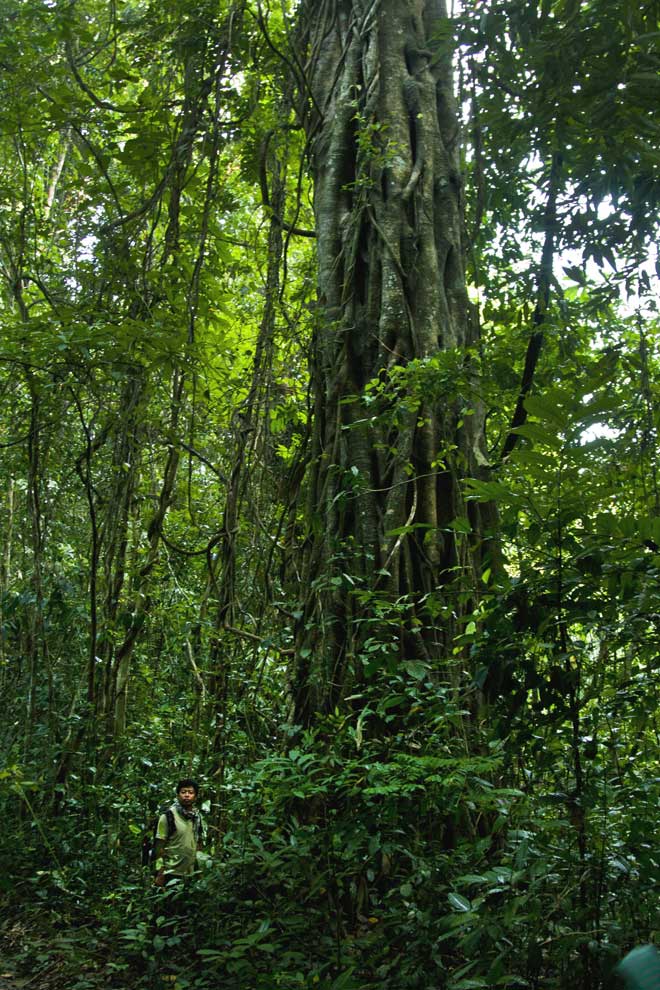
We walked in silence, not by any agreement but by some unconscious, natural understanding. Slowly and slowly we were getting sucked into a fairytale world. The creepers turning into serpents. The trees transforming into trolls and gnomes. We could hear the forest’s voice. Every forest has its own voice; here it spoke in murmurs and sighs. Here it breathed heavy. Its rustling whispers we cannot understand.
The partridges were calling again. “Dakhooo, Dakhooo.”
We heard the soft rasping of a big bird flying out. The squirrels clucked. Suddenly a brown hawk owl broke its slumber with a sleepy, gurgling call. And then fell silent again.
We sat on the trunk of a fallen tree and felt the presence of life around us. We felt the trees. Their symphonies in their highest branches. Their search for infinity with their roots. Their own fulfilment.
I touched the trunk and felt its kernel. I touched hundred years of stories and whispers. I felt both eternity and end of eternity. I felt trust and strength. And I felt sleep creeping over me.
About two hours later, we came to the edge of the forest. A stream ran across here with crystal clear water.
In front of us lay a different view. In the afternoon light, we could see a valley flooded in golden rays. For a vast stretch, ripened Jhum paddy swayed in gentle breeze. The sun reflected on the paddy to produce a golden glow. Carcasses of tall trees stood still against a deep blue sky sprinkled with white clouds. There was a distinct smell of ripened paddy, Tishi and other all sorts of unrecognizable seeds. In the distance we could see a bamboo lean-to.
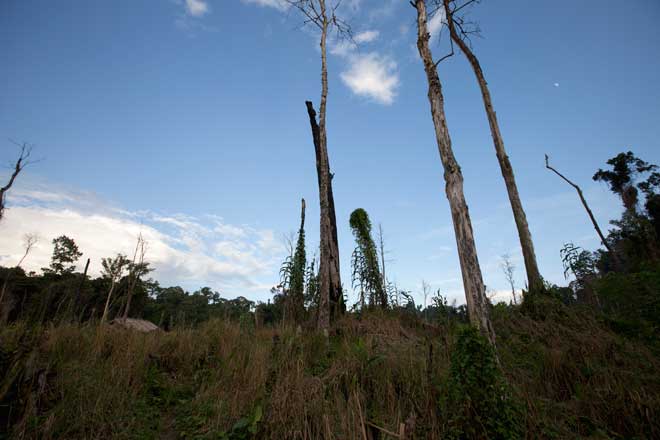
This turned out to be our camp for the next three nights. The Chakma couple has four kids – three boys aged between 11 and three and a lovely six-year-old girl.
Our tired bodies badly needed a bath in the cool stream water. The sun had already gone beyond the hills and forest; a pale light made the dusk mysterious.
In that light, the head of the family came with an orange-bellied squirrel hunted from the forest. The fluffy body of the squirrel touched soft and warm.
We climbed to the balcony. Dochowani along with Deki Shak steamed with Nappi was served. The moon was bigger today and the whole valley was awash with moonlight. We could make out every single tree on the edge of the forest. We could see the stream from up here. Beyond that another hut of another family. A mountain scops owl was calling. It was joined by a brown hawk owl. The night was settling in on this remoteness.
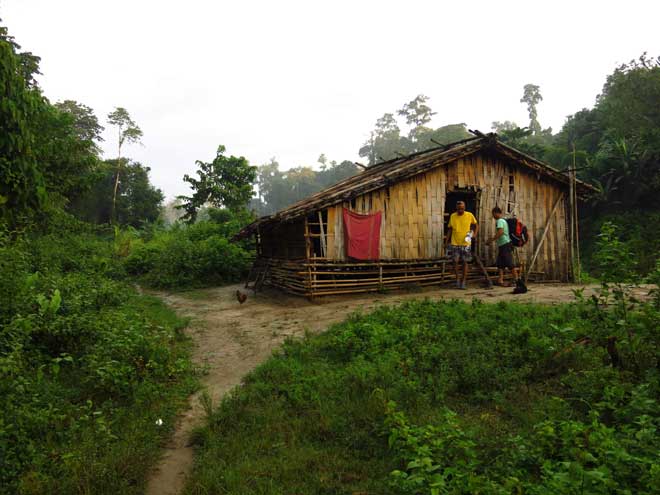
We talked as we watched the woman of the house make Bar-B-Q of the squirrel, rolling the stick over and over on the ember flame.
This family used to live in Baghaihat, a settlement very long away from here. Then there was a Bangalee-Chakma riot and all the Chakma houses were burned down. Insecure and jobless, they migrated and went deeper and deeper into the forest until they found this place.
It was deep forest all around, just as pristine as we had seen earlier in the day. They cleared it up – the size of a big stadium – and went for Jhum cultivation.
“We made good harvest this year,” Susanta Chakma, the head of the family said. The evidence we could see in stacks of jute sacks in the inside room. More paddy is waiting to be harvested. “Next year, we will abandon this place and clear the next patch of forest.”
Susanta’s neighbour Anil had also joined us. He has a rather peculiar story to tell.
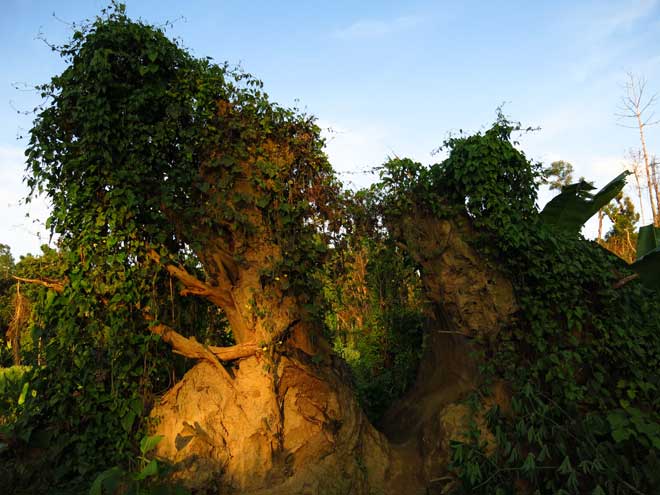
Anil was living happily away from here. But then he suddenly found that his belongings – plates, glasses, and even mats – are vanishing into the blues. A tight watch round the clock could not stop the mystery. He went to the priests who said spirits are angry with him and so he has to make them happy with offerings.
So Anil had to spend a hefty amount and soon his lost articles started reappearing around his house. His quilt found on the fence, plates in the backyard.
“I was scared. I knew my friend had come here to start life anew. So one day, I also packed up and came,” he said.
Anil will also move to a new patch next year.
Dinner consisted of venison, pumpkin and leaves of potato plants to go with chili paste.
The lights went out and I lay there on the bamboo perch and looked out. The whole world was now washed over with moonlight.
I felt sad and my heart was heavy. With Jhum cultivation starting here, this forest has no future. If seven stadium-sized patches are cleared every year by these seven families, how long will it take for the forest to disappear? Five to ten years at best? Because once it is depleted the remaining forest will have no value.
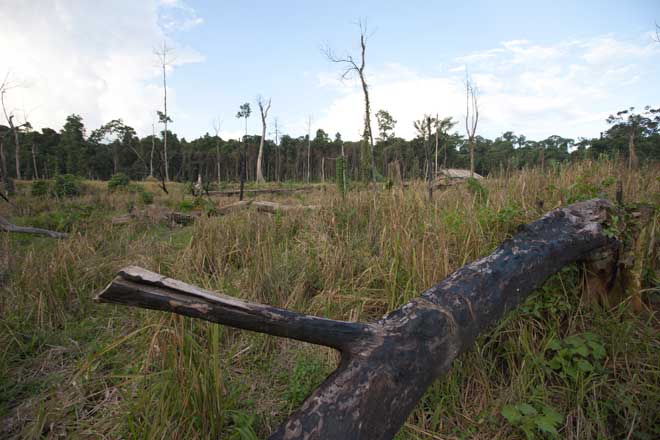
I could see the future of Lakkhichhari reserve forest in the dead trunks standing on the Jhum.
But then these hapless people also have no future. They have no alternative. They are doing what they must do. And once the whole forest is gone, they will be in even greater distress.
Morning starts early here. By the time I was up, the lady of the house was busy putting the paddy to dry. I could not find the two elder children. The girl and the little kid were playing on the fallen tree across the creek. The tree is so big that they have dug a hole through the roots to go on the trunk and cross the creek.
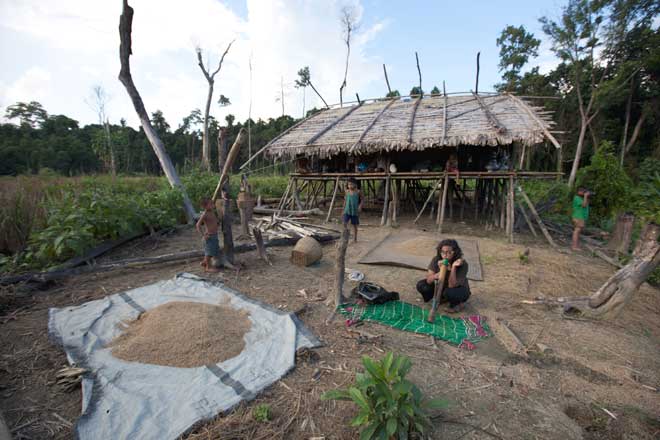
Big black Carpenter bees hummed around. Persisting yellow bees kept coming to us, creeping over our skin. There was a distinct smell of Til flowers in bloom.
I lazily watched the children play like some wild goats on the tree trunk. They jumped and ran, they swung and somersaulted . Their laughter ringing loud in the valley. Their tattered clothes flapped in the wind.
A pack of 12 great slaty woodpeckers passed over to the forest, a rare sight today. Thousands of birds were chirping and singing around. The whole valley was kind of floating on bird songs. And I was bobbing on the waves.
The lady then chopped wood, after which she vanished towards the creek with five big pitchers. After a while she appeared with the pitchers perfectly balanced on top of her head. Fetching water is a tough job. I can’t imagine doing it several times a day.
She had dug some holes by the creek where water filters into. This they use for drinking. The creek water is for cooking.
The little kids came home carrying various leaves and ferns. They had dug out wild tubers, which when boiled tasted like sweet potato.
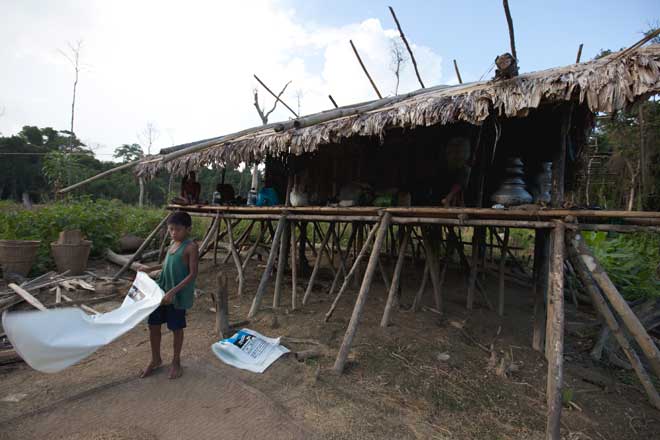
The lady got down to cooking. Cooking in the hills is a simple affair. You just boil and add some Nappi and ginger. No oil or spice. But a lot of red hot chilli.
Breakfast was simple. Rice and boiled leaves.
As the sun rose higher, neighbours started streaming in. They somehow had come to know that there was a doctor with us – Dr Ronald Halder. So they wanted to grab this opportunity to get free treatment.
A woman had been suffering from chronic dysentery. She needed some anti-biotic. Someone was having fever. Another had toothache. So we handed out paracetamol tablets and oral saline. We carried some basic anti-biotics for all purpose treatment. We gave those too. A very old woman had asthma. But we could not help her.
A little child came with a badly swollen carbuncle on his throat. It must be paining a lot, but he was not crying. There was little we could do. So the doc advised the parent to apply coal poultice.
I wondered how these people survived without any healthcare here. The nearest treatment should be two days away.
By the time we had finished with our clinic, a man walked in with a strange looking tortoise about seven inches. None of us had seen its kind before. It obviously looked like a land tortoise unknown to us. This precious thing was going to be our lunch.
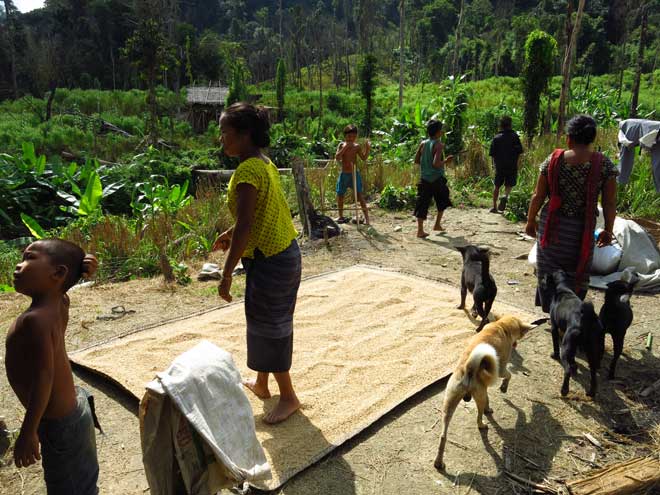
Dr Halder queried the man a lot about where he had found it and whether he had seen many of them before. Then he offered to buy it from the man.
The tortoise hunter gave a broad grin. “Take it. You don’t have to pay.”
For the next two days, the tortoise was tied to a pole. It did not eat anything. But this species can go without food or water for a long period. Brought back to Dhaka, it was identified as a rare species – Keeled box turtle. It was the first live specimen found in Bangladesh. It is now doing well at the turtle conservation centre in Gazipur.
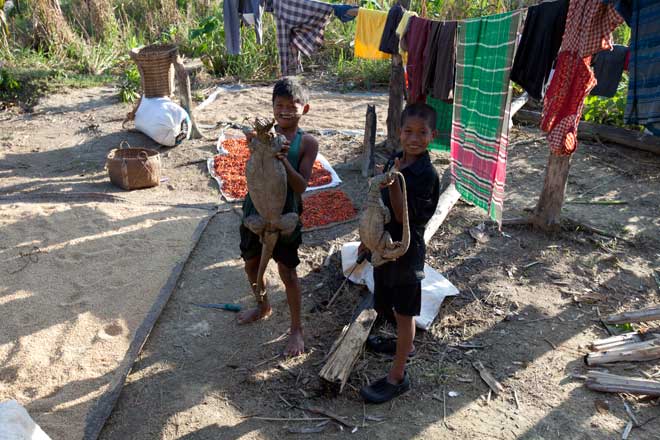
In the afternoon, the elder kids returned, each of them carrying a monitor lizard. One was quite huge, about four feet long.
Their legs were tied and they were rolled into coils. They looked helplessly with sullen stares.
As the kids dropped them to the ground, the animals flinched in pain. The whole family gathered around them. Their joy was palpable. The children weighed them in their hands. The men and women felt for their meat and praised the kids for their bravery.
The smaller lizard was more agile unlike the bigger one which seemed to have resigned to its fate. From time to time, it squirmed to get free. And every time it wriggled, the children would hammer it. And when nobody was looking, it finally got its hind legs free and bolted out in lightening speed.
I watched it with bated breath. My every inch praying that it could escape. The kids hollered after it and in ten seconds it was caught again. As a runaway, it received some rough treatment. Its legs were secured tightly. The poor animal just lay there, panting.
Later, when we went for a walk, it again broke free, and this time it vanished into the jungle.
But for now, a fire was being built. The big one was carried to a distance to the bush and from the perch, I saw a knife being produced. I could see crimson blood splattering on the grass.
In the evening, I was sitting on the bridge above the creek. All around me the darkness was surreptitiously creeping in. the sky in the west was catching the late evening fire and the flares were streaking out with clouds.
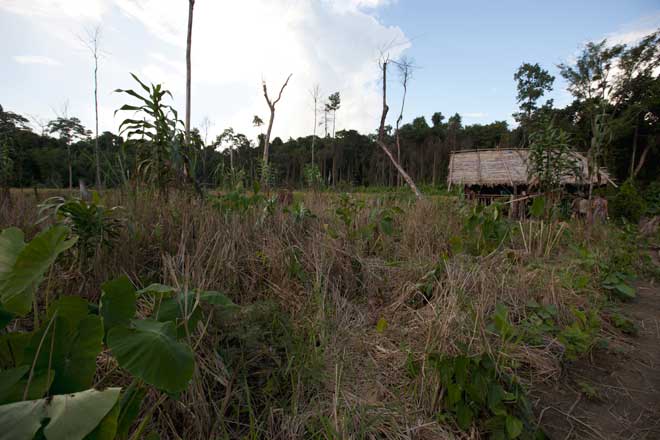
The valley looked unreal. Ephemeral. Existence seemed illusory . Here only loneliness prevailed. Even the crickets could not beat that feeling. I kept losing myself. I did not know where I was. In Asia, Europe, North America or some other place.
I tried to think about the people living here. I could see in the distance the other cabin. The woman of the house walking on the perch, topless. Her husband standing and smoking the Hukka. She glanced at me and went back to doing what she was doing.
Her existence made the feeling of loneliness even more oppressive. The barrenness of the valley, contrasting with the deep forest made me depressed.
I tried to think of Henry David Thoreau. His Walden. “Why should I feel lonely? Is not our planet in the Milky Way? What sort of space is that which separates a man from his fellows and makes him solitary?”
I could see the space. I could feel the distance. I only looked for the stars but did not find a single one in the Milky Way.
I shivered as the breeze turned cool. Just then I saw two big birds — two great eared nightjars — coming my way in their graceful movement. They looked like two ballerinas dancing in the sky.
With the beating of their wings, the darkness whirled in murkiness. They circled above me and vanished over the hills.
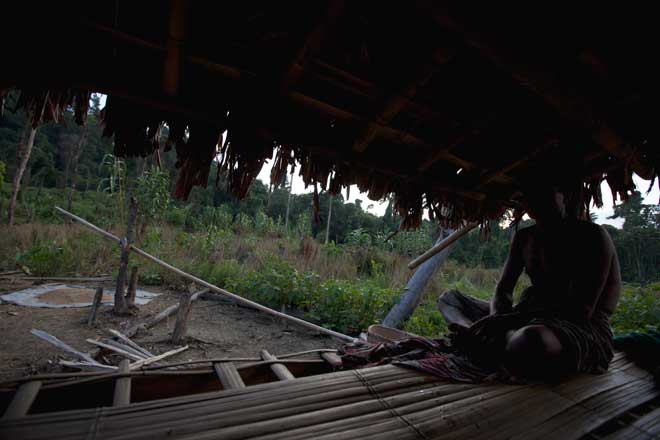
That night they talked of tigers. The big tigers. They have seen their pugmarks only a few months ago. Dampa Tiger Reserve of India is only 40km from here. So stray tigers might come this way.
After dinner I lay in the sleeping bag. The valley was again washed with moonlight. The water in the creek glistened.
Suddenly a sharp cry came from the creek. A blood-curdling cry. Once and then again. We all heard it and froze in our small talks.
What could it be? A fishing cat? A leopard? I imagined the leopard we had seen marks of in the jungle. I imagined it had come to see us and complain that its territory is getting squeezed. It had come to plead not to take over its land.
I was lost in the thoughts of survival of the fittest.
We left early in the morning. Before 7:00am. It is a long journey back again.
Now we have more people with us. We have to take a thin, jaundiced man who is suffering from a bad bout of malaria. His malaria had now turned into jaundice. His rickety wife and a little girl were also going.
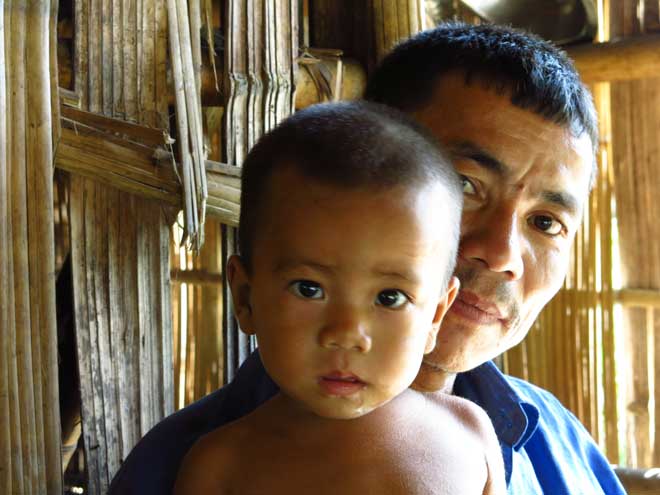
As we were walking across the creek, Dr Halder froze. He was wide-eyed and groping for his camera. The next moment his face distorted in agony as a kingfisher flew away.
“Blyth’s Kingfisher!” he whispered. “God! I just missed that!”
The rarely seen bird just slipped away into the forest. We had no time to look after it now.
So we walked on.
All day long, the malaria-stricken man sat silent, looking lost and dazed. He was taking a sack of paddy with him. The family would sell the paddy and buy treatment. His girl merrily sang all the way until dusk fell and she went to sleep.
We all felt tired. As the boat took the last turn, I saw a spotted owlet sitting on a pole by the bank. It was looking at us with big round eyes.


 For all latest news, follow The Daily Star's Google News channel.
For all latest news, follow The Daily Star's Google News channel. 



Comments